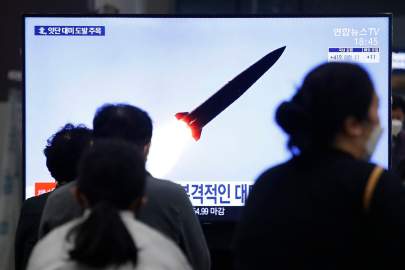North Korea Gives Biden a Missile Test—a Familiar Hello

SEOUL—It’s one of North Korea’s time-tested tactics: welcome a new U.S. administration with a provocative weapons test.
With Thursday’s ballistic-missile launch, North Korea has now tried to use military fireworks to grab the attention of a new White House over four consecutive presidencies. The aggression hasn’t proven very successful, as Pyongyang ended up more sanctions-strapped than it had before.
But this time, the Kim Jong Un regime and the Biden administration find themselves with little leverage to force the other side to bend to their demands.
North Korea’s weapons tests haven’t compelled the U.S. to bring a substantially different stance to stalled disarmament talks. Pyongyang’s spree of short-range missile launches in recent years have also been played down by Washington, giving the Kim regime latitude to advance its weaponry but lessening the shock value.
Compared with weapons tests carried out at the start of previous U.S. presidencies, North Korea’s test of two short-range ballistic missiles on Thursday was relatively modest. Former President Barack Obama, weeks into his second term in February 2013, saw Pyongyang detonate a nuclear bomb.
At the same time, the Biden administration is dealing with a North Korea already hit hard by sanctions and the pandemic. Pursuing fresh restrictions would also be challenging, as China and Russia, whose approval would be necessary at the United Nations Security Council, are unlikely to back such measures. Tough talk could push the Kim regime, already resistant to engagement, even more inward.
“Sanctions have not been working well in terms of inducing or persuading North Korea to come back to the negotiating table,” said Chiew-Ping Hoo, a Korea specialist at the National University of Malaysia. “North Korea’s self-imposed lockdown has shown itself to be more effective [at crippling the economy] than sanctions.”
Before Thursday, North Korea hadn’t test-fired a ballistic missile in nearly a year. Japan called the ballistic-missile test a violation of U.N. resolutions and lodged a complaint via North Korea’s embassy in China. Senior officials from the U.S., South Korea and Japan convened by phone.
Pyongyang, whose state media has yet to comment on the test, will be closely watching how President Biden reacts. It may not have to wait long. Mr. Biden is expected to hold his first formal press conference as president on Thursday.
Earlier in the week, Mr. Biden opted for a more subdued reaction to Pyongyang’s weekend launch of cruise missiles—a type of weapons test that doesn’t violate U.N. Security Council resolutions. The president said he didn’t consider that launch a provocation.
The Biden administration has yet to announce its North Korean strategy, as a policy review is nearing its end.
The missile launches for now help North Korea expand and improve its arsenal, adding weaponry that it can eventually promise not to use—or give up—during future negotiations. Pyongyang doesn’t face big risks in continuing tests of shorter-range weapons, said Kim Chun-sig, a former senior official who previously helped oversee Seoul’s North Korea policies.
“China and Russia will oppose new sanctions. Seoul will lobby the U.S. against a strong response,” Mr. Kim said. “Washington itself is paralyzed due to its unfinished policy review.”
North Korea’s return to ballistic-missile launches came as little surprise. Over the past week, Pyongyang’s state media has groaned about the combined U.S.-South Korea virtual military exercises and the extradition to the U.S. of a North Korean man accused of money laundering, as well as about how some senior Biden administration officials discussed denuclearization for North Korea, rather than for the Korean Peninsula. Talks with the U.S. are off the table for now, one of Pyongyang’s senior diplomats said.
Washington has historically taken quick action when Pyongyang has unleashed a weapons test months into a new U.S. administration.
In 2005, less than four months into former President George W. Bush’s second term, North Korea test-fired an antiship cruise missile. In the following months, Mr. Bush’s administration imposed a series of U.S. sanctions. In one instance, it persuaded Macau authorities to freeze more than 50 North Korean bank accounts at a local bank that held millions of dollars in cash.
In 2009, only months into Mr. Obama’s first term, Pyongyang launched a satellite widely seen as technology needed for long-range missiles and blew up a nuclear bomb. Mr. Obama accused the Kim regime of breaking international rules and demanded swift action from the U.N. Security Council, which did impose fresh sanctions.
Four years later, Pyongyang carried out another nuclear test less than a month into Mr. Obama’s second term. The president pushed for more U.N. sanctions on Pyongyang. In a phone call with Chinese President Xi Jinping in March 2013, Mr. Obama stressed the need for the two countries to cooperate on reining in the Kim regime.
Less than a month into former President Donald Trump’s presidency, the North launched a ballistic missile that the president called “absolutely intolerable.” Within weeks, then-Secretary of State Rex Tillerson sought to levy more sanctions on the regime. Mr. Trump’s administration meanwhile conducted a policy review that included the option of carrying out a military strike against the North, The Wall Street Journal reported in 2017
Mr. Trump would end up meeting Mr. Kim three times. But deal making didn’t produce an agreement delivering sanctions relief to North Korea or curtailing Mr. Kim’s nuclear arsenal.
The U.S. and its allies shouldn’t rule out the possibility that the recent missile launches reflect North Korea’s goal of normalizing less-serious provocations, said Koh Yu-hwan, the head of the Korea Institute for National Unification, a state-run think tank in Seoul.
“They might be trying to see if the U.S. will accept the recent tests as basic military training that any sovereign country can do,” Mr. Koh said.
Photo: North Korea has used missile launches, such as this previous, undated one broadcast in Seoul on Thursday, to grab the attention of U.S. presidents.
PHOTO: AHN YOUNG-JOON/ASSOCIATED PRESS




